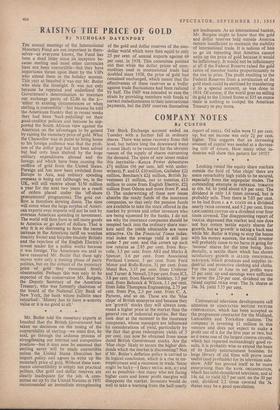RAISING THE PRICE OF GOLD
By NICHOLAS DAVENPORT THE annual meetings of the International Monetary Fund are not important in them- selves—as everyone knows, the Fund has been a dead letter since its inception be- cause sterling and most other currencies have not been convertible—but they have importance thrust upon them by the VIPs who attend them in the holiday seasons. This year at Istanbul it was our Mr. Butler who stole the limelight. It was not only because he repeated and underlined the Government's determination to maintain our exchange parity of $2.80 to the L-- 'either in existing circumstances or when sterling is conveFtible'—but because he told the Americans frankly that in recent weeks they had been 'back-pedalling' on their good-creditor policies and because he sup- ported the South African view against the American on the advantages to be gained by raising the monetary price of gold. What the Chancellor was at pains to bring home to his foreign audience was that the prob- lem of the dollar gap had not been solved but had only been shelved by the huge military expenditures abroad and the foreign aid which have been causing the outflow of gold from the United States. Foreign aid has now been switched from Europe to Asia, and military spending overseas is being cut (although we, in the UK, will still receive about $150 million a year for the next two years as a result of orders placed under the 'off-shore procurement' programme). The gold out • flow is therefore slowing down. The time will come when the large surplus of Ameri- can exports over imports will not be met by overseas American spending or investment. The world will then have to sell more goods to America or go short of dollars. That is why it is so distressing to have the recent increase in the American tariff on watches (mainly Swiss) and bicycles (mainly British) and the rejection of the English Electric's lowest tender for a public works because it was foreign. The Americans are said to have reassured Mr. Butler that these ugly moves were only a passing phase of party politics, but on the subject of the monetary price of gold they remained firmly obscurantist. Perhaps this was only to be expected of the conservative Mr. Burgess, the Deputy Secretary of the American Treasury, who was formerly chairman of the board of the National City Bank of New York, the bank whose bulletin once remarked : 'Money has to have a- scarcity value or it is no good at all.'
Mr. Butler told the monetary experts at Istanbul that the British Government had taken nO decisions on- the timing of the convertibility of sterling—we must first, he said, go through the arduous process of strengthening our internal and competitive position—but it may now be assumed that sterling never will be made convertible unless the United States liberalises her importpolicy and agrees to write up the monetary price of gold. Without these ease- ments convertibility is simply not practical politics. Our gold and dollar reserves are clearly inadequate for the job. A com- mittee set up by the United Nations in 1951 recommended an immediate strengthening of the gold and dollar reserves of the non- dollar world which were then equal to only 25 per cent. of annual imports against 69 per cent, in 1938. This committee pointed out that while the dollar prices of com- modities used in international trade had doubled since 1938, the price of gold had remained unchanged, which meant that the effectiveness of these reserves as a buffer against trade fluctuations had been reduced by half. The IMF was intended to ease the strain by providing members with funds to correct maladjustments in their international payments, but the IMF reserves themselves are inadequate. As an international banker, Mr. Burgess ought to know that the gold and dollar reserves held outside America remain insufficient to maintain the stability of international trade. It is tedious of him to go on repeating that America cannot write up the price of gold because it would be inflationary. It would not be inflationary at all if the Federal Reserve raised the gold ratios of member banks proportionately to the rise in price. The profit resulting to the Federal Reserves from a revaluation of its gold stock could be sterilised by transferring it to a special account, as was done in 1934. Of course, if the world goes on selling its gold to the United States at $35 an ounce there is nothing to compel the American Treasury to pay more.
































 Previous page
Previous page